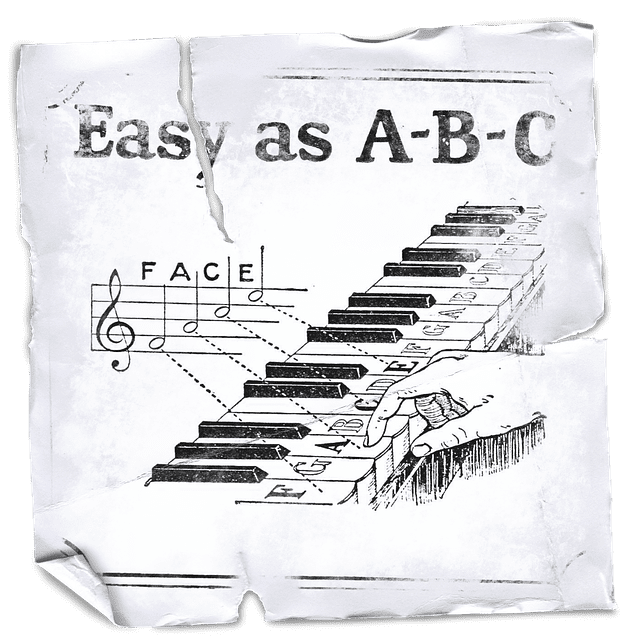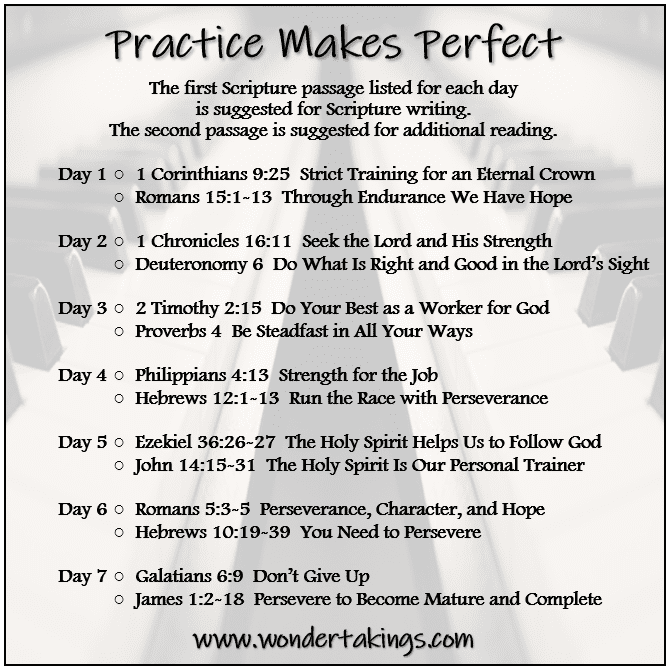Practice Makes Perfect
“What you have learned and received and heard and seen in me — practice these things, and the God of peace will be with you.”
Philippians 4:9 ESV

How do we learn to follow God and become the people He wants us to be? Like learning music, sports, academics, or anything else, it takes practice — lots of practice. And we can expect to be bad at it when we are beginners. I play the piano, and I know how many agonizing hours of rehearsal it can take before I can play a piece well. My family has often had to endure listening to me repeat the same few measures over and over, first with one hand, then with the other, then slowly together, then up to tempo, then slowly again after making too many mistakes, then a huge sigh and up to tempo again, then an angry crash on the keys when I’ve gotten too frustrated to continue. The video below illustrates it well. In fact, my daugher is the one who sent it to me. She said, “This reminds me of you,” and I responded, “Definitely!”
That piece is supposed to be Chopin’s Nocturne in E-flat major. I have included a video of it being played correctly at the end of this post, but I’m sure the pianist didn’t become proficient without first sounding like what we heard in the video above. No one is born with the ability to play Chopin perfectly, not even Chopin himself. We are born with natural talents and abilities, but we must develop them through years of practice and training.

“May we be . . . open-minded, eager, and discerning students of the very words of God.”
Randy Alcorn
Learning something new takes time and commitment. My algebra students often comment that I make mathematics look easy. They think I must be much smarter than they are. But I tell them it’s not that I’m brilliant and they’re not — it’s that I’ve had a lot more years of practice. I tell them they can’t expect to just watch me work out a few math problems on the board and then instantly be good at algebra. They must study the lessons in the textbook and then apply them by working through lots of problems. If they get stuck, they need to ask me for help. It’s hard work, but the payoff is huge when they get to walk across the stage on graduation day. The same is true of our spiritual training. We can’t expect to be good at it if we don’t practice. We must begin by studying the lessons in God’s Word, the textbook for our lives. Then we must apply what we’ve learned by working through all the problems we face. If we get stuck, we need to ask our Teacher for help. Only by doing this can we expect to improve our skills so that we can transition from students to graduates, ready to do God’s work in the world.
“All Scripture is God-breathed and is useful for teaching, rebuking, correcting and training in righteousness, so that the servant of God may be thoroughly equipped for every good work.”
2 Timothy 3:16-17 NIV

“Train yourself in godliness; for while bodily training is of some value, godliness is of value in every way, as it holds promise for the present life and also for the life to come.”
1 Timothy 4:7-8 RSV
John Ortberg says, “Spiritual transformation is not a matter of trying harder, but of training wisely.” No matter how hard I try on the day of the event, I will not be able to run a marathon or play the violin or pass a graduate-level physics exam if I haven’t trained for it first. Our skills must be developed over time so that we will be prepared when it is time to perform. The same is true of our spiritual life. We must study, practice, and hone our skills so that we will be ready for the tests and trials that come our way. John Ortberg explains:
“People sometimes think that learning how to play Bach at the keyboard by spending years practicing scales and chord progressions is the ‘hard’ way. The truth is the other way around. Spending years practicing scales is the easy way to learn to play Bach. Imagine sitting down at a grand piano in front of a packed concert hall and having never practiced a moment in your life. That’s the hard way. This need for preparation, or training, does not stop when it comes to learning the art of forgiveness, or joy, or courage. In other words, it applies to a healthy and vibrant spiritual life just as it does to physical and intellectual activity. Learning to think, feel, and act like Jesus is at least as demanding as learning to run a marathon or play the piano.”

So how do we do this? Well, first we need to know what God wants from us. We do this by studying His Word. God works in mysterious ways, but He doesn’t keep His will a complete secret from us. He speaks to us through His Word. We must develop a habit of reading His Word every day and meditating on what He reveals to us. When we become Christians we are given the gift of the Holy Spirit. He will speak to us through the written Word of God by making certain verses stand out to us while we are reading the Bible. But we must develop a daily habit of Bible study, learning to listen for and obey His voice. This is sometimes difficult, but the more we practice, the easier it will become.
“The Bible is the revealed will of God. If you want to live in His will, then ‘let the word of Christ dwell in you richly’ (Colossians 3:16). Fill your heart and mind with the Word of God, trust in His empowerment to obey Him, and confess and repent when you disobey and fail. If you do this, you will be living in the will of God.”
Randy Alcorn
Once we know what God wants from us, it’s time to apply what we’ve learned. While it’s possible to do this during the times in our lives when everything seems to be going our way, it’s even more beneficial to our spiritual growth to do this during the problems and trials we face. As with anything else, we must push ourselves to get better. But we also need to be aware that we may fail before we improve. It’s much better to make mistakes during practice than on the “big day,” so we must find ways to discover and correct our weaknesses when the stakes aren’t so high. John Ortberg suggests examining the sins we tend to struggle with in order to find spiritual practices that will help us overcome them:
“On the diagnostic side, sin can be divided into two general categories: sins of omission and sins of commission. Sins of omission involve not doing those things we ought to do; sins of commission consist of things we do that we ought to avoid. Similarly, Dallas Willard notes that spiritual disciplines can be placed in two categories — disciplines of engagement and disciplines of abstinence. Disciplines of engagement involve my intentionally doing certain things. Worship, study, fellowship, and giving are all disciplines of engagement. By contrast, disciplines of abstinence involve my intentionally refraining from doing things. These include practices such as fasting, solitude, and silence. Here’s the connection: If I struggle with a sin of commission, I will generally be helped by practicing a discipline of abstinence. In other words, if my problem is that I am doing something I ought not to do, I need to practice a discipline that strengthens my not-doing muscles. . . . If I struggle with a sin of omission, I will usually be most helped by a discipline of engagement. That is, if my sin involves a failure to love or encourage or serve, I need practices that will help my doing muscles.”
Ortberg explains that almost any activity can be turned into a spiritual discipline. We just think about how Jesus lived and try to emulate Him. Whenever we fall short, we find a way to practice overcoming whatever we’re struggling with. And we don’t have to go it alone. We always have the resources of the Holy Spirit to help us. In fact, spiritual transformation is His job, not ours. As John Ortberg explains, “Following Jesus simply means learning from him how to arrange my life around activities that enable me to live in the fruit of the Spirit.” This could be practicing a day of silence if we’re prone to gossip or dedicating a day to celebration if we struggle with joylessness. The key is to keep at it, letting the Holy Spirit lead us. We need to stay connected to God and keep practicing.
“We must seek to continually evaluate our beliefs and lifestyle preferences by God’s Word. As the old adage says, ‘If you always do what you’ve always done, you’ll always get what you’ve always got.’ Our hearts and characters won’t change unless our daily habits change. Holy habits such as meditation, prayer, and church attendance should be determined commitments. . . . Let’s choose to be in touch with the mind of God.”
Randy Alcorn

“Then the way you live will always honor and please the Lord, and your lives will produce every kind of good fruit. All the while, you will grow as you learn to know God better and better.”
Colossians 1:10 NLT
So what is the goal? What is the outcome of all this training? God wants us to become mature Christians so that we can do His work. As we grow through all the hardships we face, we bear fruit that glorifies Him and shines His light in the world. Once we have the basics of spiritual life down, God can guide us to use our wonderfully colorful lives in amazing ways to help others. After all, the goal of practicing a difficult piano piece is to make beautiful music that blesses everyone who hears it. We can also pass on what we have learned. We can teach others how to grow in the Lord. Learning to overcome our struggles trains us to help others. God will often put certain people in our lives precisely because we are uniquely qualified to help them. When we learn how to live in a close relationship with God, hearing His voice and doing His will, we can teach others, especially our children, how to do the same.
“Train up a child in the way he should go;
Proverbs 22:6 ESV
even when he is old he will not depart from it.”

“Pray in the Spirit at all times with all kinds of prayers, asking for everything you need. To do this you must always be ready and never give up.”
Ephesians 6:18 NCV
Spiritual training, like any other training, is not easy, but we can’t give up. The stakes are too high. We will struggle, and at times we will fail. But if we persevere, with the help of the Holy Spirit we will succeed. This week’s Scripture passages focus on spiritual training, strength, and perseverance. There is a printer-friendly pdf version below the image. I have also included a video of Chopin’s Nocturne in E-flat major. Compare this performance to the “Frustration” version at the beginning of this post, and let it serve as a reminder of what can be achieved when we are willing to practice.

“Play his praise on a grand piano!”
Psalm 33:2 MSG

References:
- Alcorn, Randy. Seeing the Unseen, Expanded Edition: A 90-Day Devotional to Set Your Mind on Eternity. Multnomah, 2017.
- “Chopin: Nocturne Op.9 No.2 in Eb Major (Moravec).” YouTube, uploaded by Ashish Xiangyi Kumar, 15 May 2018, www.youtube.com/watch?v=IJIgCMjuia0.
- Ortberg, John. The Life You’ve Always Wanted: Spiritual Disciplines for Ordinary People. Zondervan, 2002.
- “Piano Practice Frustration.” YouTube, uploaded by Piano League, 7 July 2019, www.youtube.com/watch?v=h5u8YWCRfVM.
Images:
- Piano Keys featured image by Nathaniel Stensen from Pixabay
- Piano Keys with Sheet Music image by Steve Buissinne from Pixabay
- Easy as A-B-C image by Oberholster Venita from Pixabay
- Adult Hands on Piano Keys image by StockSnap from Pixabay
- Piano Concert image by jswerd from Pixabay
- Colorful Piano Keys image by b1-foto from Pixabay
- Adult and Child Hands on Piano Keys image by StockSnap from Pixabay
- Grand Piano image by PIRO4D from Pixabay